[ad_1]
When talking about the best quarterbacks of all time, these days we focus on Tom Brady, and that’s fair. Before Brady, though, there were a lot of people who would have thrown the name Joe Montana out there. Montana was one of the faces, and arms, of the NFL for many years, and he has the Super Bowl rings to prove it. Let’s take a look back at the career of the quarterback who turned the 49ers into the franchise of the ‘80s.
1 of 20
Montana chooses Notre Dame
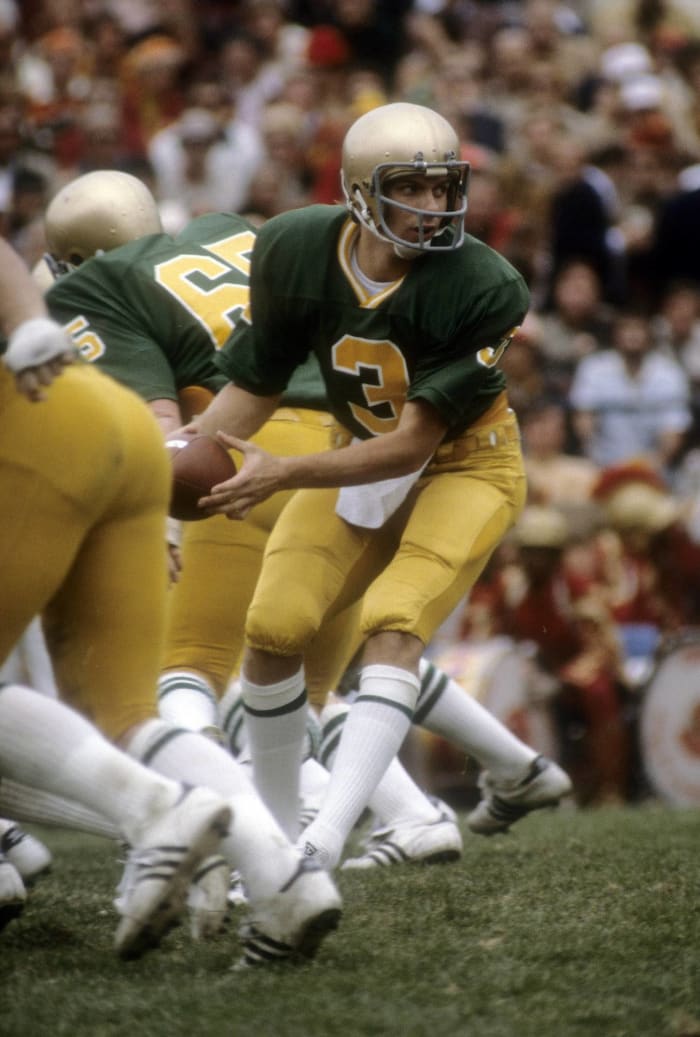
Focus on Sport/Getty Images
Montana did not become a starter in high school until he was a junior, but he quickly rose on the national scene. His personal hero growing up was Terry Hanratty, who had played at Notre Dame. As such, Montana decided to sign on to play with the Fighting Irish in college as well.
2 of 20
A slow start to his college career
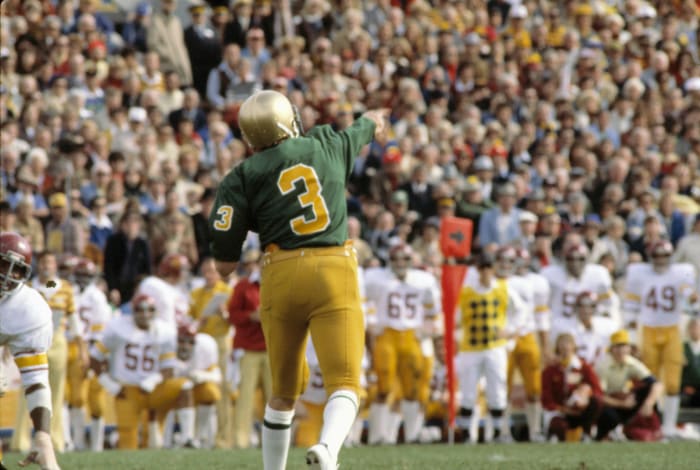
Notre Dame/Collegiate Images via Getty Images
The beginning of Montana’s college career was bumpy at best. For starters, Ara Parseghian had a policy against playing freshman, so Montana didn’t get to play his first year. Then, Parseghian resigned and was replaced by Dan Devine, who did not start Montana to begin the 1975 season. Eventually, Montana got the gig and was playing already, but a separated shoulder led him to redshirt for the 1976 season.
3 of 20
Montana wins a college title
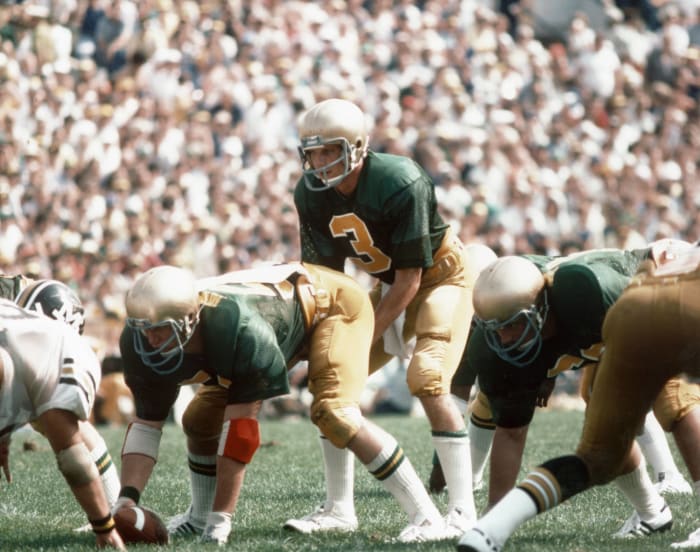
Notre Dame/Collegiate Images via Getty Images
In 1977, Montana began the season as the third-string quarterback as he returned from injury, in the third game of the season Montana came in to play against Purdue due to quarterback injuries and led the Irish to a comeback win. This gave Montana the job going forward, and after a 38-10 win over Texas in the Cotton Bowl, Notre Dame won the national title.
4 of 20
The Niners take Montana in the third round
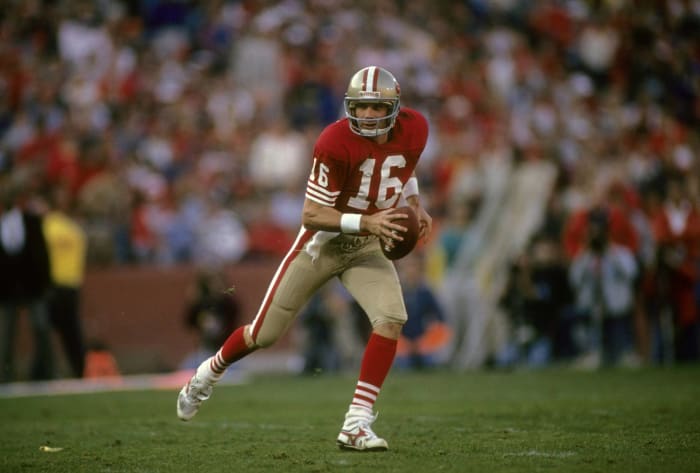
Focus on Sport/Getty Images
Montana returned to college for his redshirt senior season and then entered the 1979 NFL Draft. Three quarterbacks went in the first round, the only one of which found success was Phil Simms. Montana would be the fourth quarterback taken, but the San Francisco 49ers did not select him to the 82nd pick, leaving the future Hall of Famer to the third round. Hey, it’s not quite Tom Brady, but it’s a steal.
5 of 20
Taking over as starter
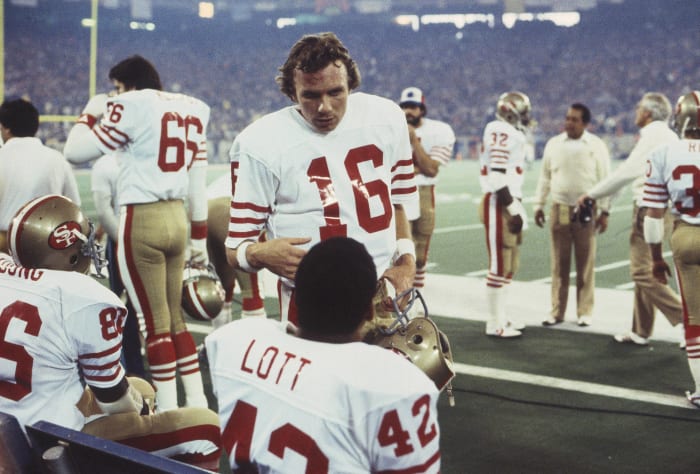
Focus on Sport via Getty Images
In his rookie campaign, Montana served as Steve DeBerg’s backup for the entire season. Halfway through the next season, Joe would become the starter, a job he would hold on to. While the Niners only went 6-10, Montana led the league by completing 64.5 percent of his passes.

Bettmann / Getty Images
The 49ers were not a team known for success heading into the 1981 season. Montana would change things. He led the Niners to a 13-3 record, including two fourth-quarter comebacks. Then came the NFC title game against the favored Dallas Cowboys. Montana and the San Fran offense got the ball on their 11-yard line with about five minutes left down 27-21. Joe was able to lead the Niners on a drive that ended with a third-down touchdown pass from Montana to Dwight Clark with 51 seconds left. The Niners won, and that play became known as simply “The Catch.”
7 of 20
The first Super Bowl win, and the first Super Bowl MVP
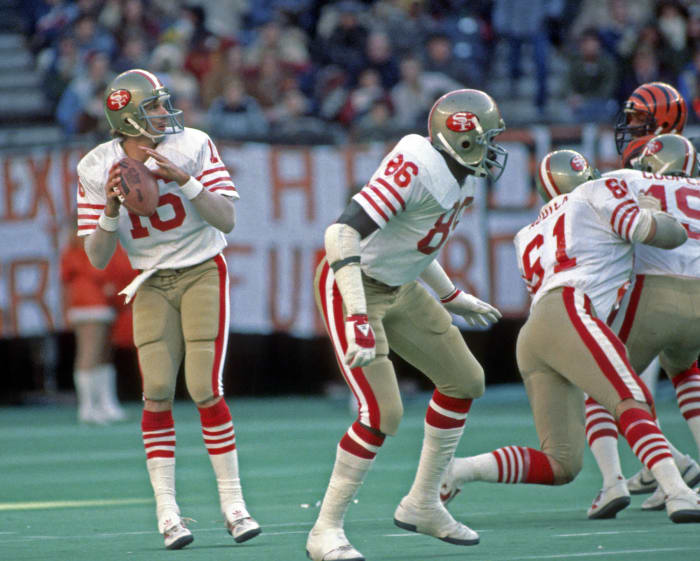
George Gojkovich/Getty Images
“The Catch” is what led the 49ers to their first Super Bowl appearance. San Fran was facing the Cincinnati Bengals, a formidable team at the time. Montana only went 14-for-22 for 157 yards with a passing touchdown and a rushing touchdown, but that was enough to lead the Niners to a 26-21 win. He was named Super Bowl MVP, becoming the second quarterback at the time to win a college title and a Super Bowl as a starter.
8 of 20
Montana outduels Marino in the Super Bowl
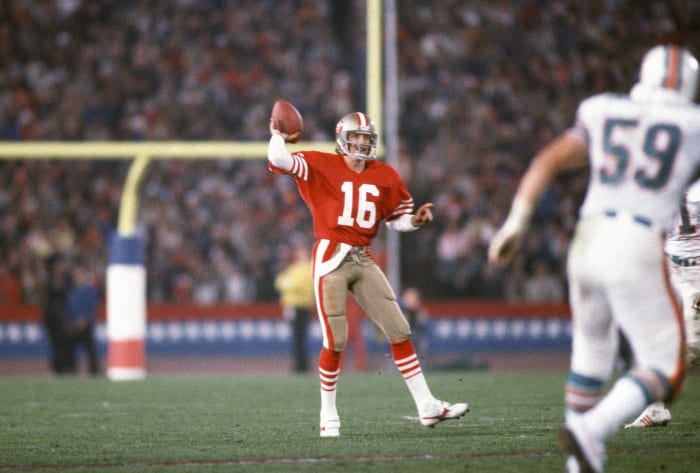
Focus on Sport/Getty Images
The 1984 season led to quite a battle in the Super Bowl. Montana had helped the 49ers to a 15-1 record. No team had racked up 15 regular-season wins before that, as the 1972 Miami Dolphins had played a 14-game regular season. Speaking of the Dolphins, 1984 was when Dan Marino won the MVP and rewrote the record books with over 5,000 yards passing and 48 passing touchdowns. Montana and Marino led their teams to the Super Bowl, but there it was “Joe Cool” who set a Super Bowl record with 331 passing yards as the Niners won 38-16. Marino may have won the regular season MVP, but Montana was the Super Bowl MVP.
9 of 20
A serious injury and a Comeback Player of the Year Award

David Madison/Getty Images
In the first week of the 1986 season, Montana suffered a serious back injury that required surgery. At the time, his doctors suggest he retire. However, the quarterback was able to return in November of that same season. Montana managed to make eight starts, though he struggled. He actually threw more interceptions than touchdowns. That being said, returning from a career-threatening injury got him a Comeback Player of the Year Award.
10 of 20
Quarterback controversy is settled with a Super Bowl win
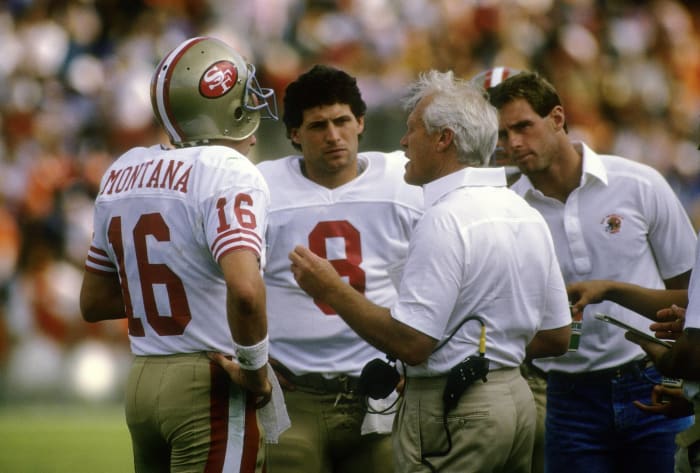
Focus on Sport/Getty Images
Prior to the 1987 season, the 49ers would trade for Steve Young, who would go on to a Hall-of-Fame career of his own. This led to quarterback controversy after Young impressed during the 1987 campaign. Young also saw playing time in the 1988 season, but they struggled to a 6-5 start to the season. Montana would take over as the clear starter to end the year and led the Niners to a 10-6 record and the playoffs. Once there, Montana led the 49ers to another Super Bowl, once again matching up with the Bengals. Down three, San Fran found themselves at their own eight-yard line with 3:20 left. Montana marched them down the field, hit John Taylor for a touchdown, and the Niners won. The job would remain Joe’s.
11 of 20
Montana wins his first MVP, adds another Super Bowl MVP
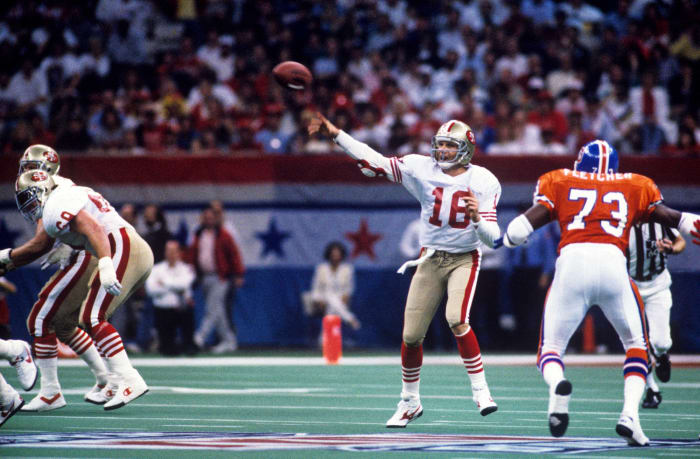
Rich Pilling/Diamond Images via Getty Images
In 1989, free of a quarterback controversy, Montana led the 49ers to a 14-2 record. You may not believe in quarterback rating as a stat, but Montana set a record for that statistic that season, which probably helped him with his first MVP. That wouldn’t be his only MVP of that season. The 49ers absolutely trounced John Elway and the Broncos in the Super Bowl by a score of 55-10. Montana threw a whopping five touchdowns and won his third Super Bowl MVP.
12 of 20
Back-to-back MVP seasons
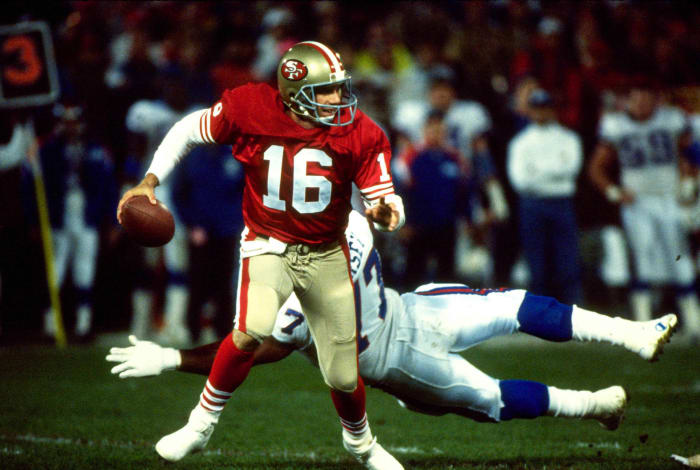
Dan Honda/Getty Images
The next year, Montana would win his second MVP in a row, although this was maybe a dubious one. Yes, he threw for 3,966 yards and 26 touchdowns, but he also threw a career-high 16 interceptions. Still, with no running game supporting him San Francisco went 14-2 and that probably helped Montana be named Most Valuable Player.
13 of 20
Injuries end Montana’s time in San Francisco
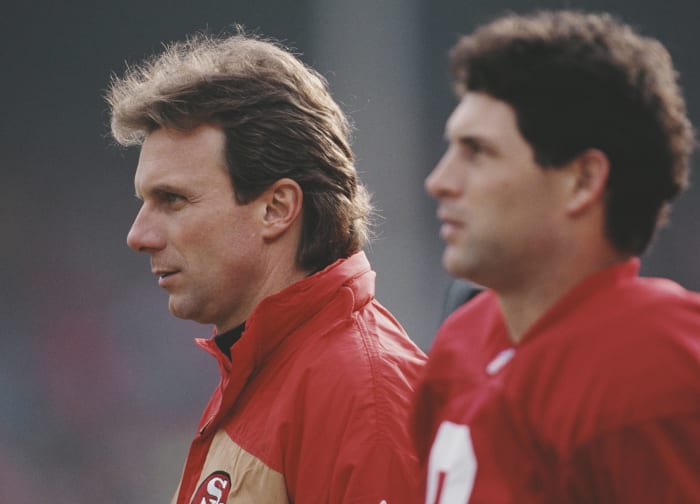
Mike Powell/Allsport/Getty Images
Montana suffered a serious elbow injury in the 1991 preseason, which cost him to miss that entire campaign and most of the 1992 season. This allowed Steve Young to really show his stuff, and it started to feel like the torch had been passed. Young would effectively hold onto the starting job, leaving Montana as the odd man out in the Bay Area.
14 of 20
Montana is traded to Kansas City

Mitchell Layton/Getty Images
With Young ensconced as the new starter for the Niners (he would win a Super Bowl there himself so you can’t really complain about the move) the team traded him to the Kansas City Chiefs, where he signed a new contract. At the same time, the Chiefs added Marcus Allen at running back, who would become a Hall of Famer himself.
15 of 20
One more Pro Bowl, one more playoff run
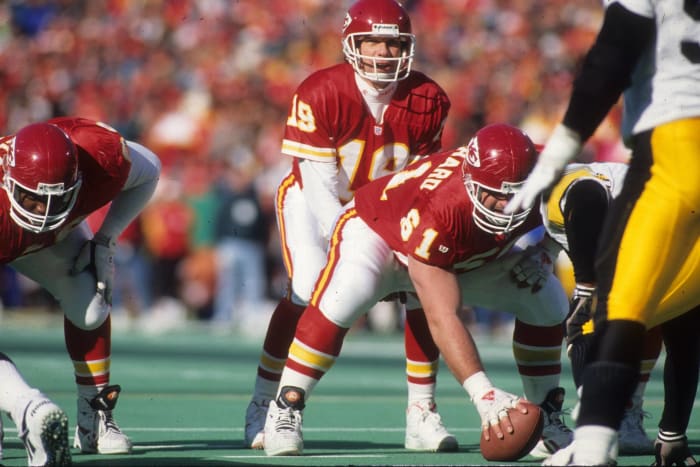
Joseph Patronite/Getty Images
Montana was banged up during the 1993 season, but he still made one final Pro Bowl and led the Chiefs to the playoffs. There, he showed that old magic in pulling off two come-from-behind wins, taking KC to the AFC title game. Unfortunately, he suffered a concussion in that game, and the Buffalo Bills would head to yet another Super Bowl.
16 of 20
The final season
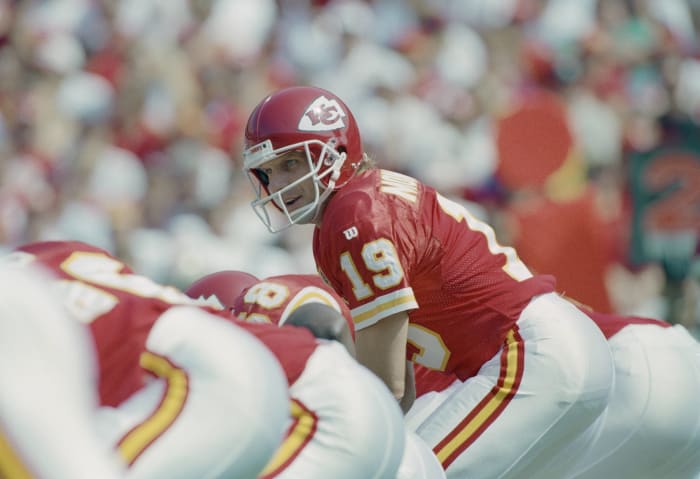
Joseph Poellot/Getty Images
Montana would return for one last season in 1994. He outdueled John Elway one week and beat the 49ers another, and the Chiefs finished 9-7. There would be no magic there, though, as Dan Marino and the Dolphins eliminated the Chiefs in the Wild Card round.
17 of 20
Joe Montana retires
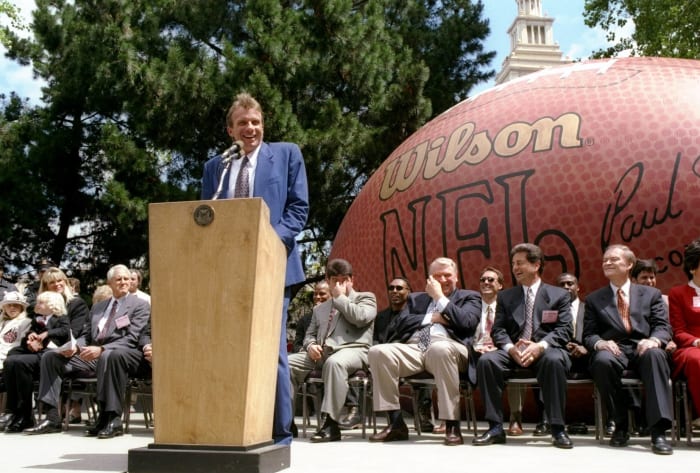
Otto Greule/Allsport
While he had signed a three-year deal, Montana would only play two seasons with the Chiefs. The retirement announcement was done before a big live crowd in San Francisco and broadcast live over local television. During Super Bowl XXX at the end of the 1995 season, the league would honor Montana by letting him do the ceremonial coin toss.
18 of 20
Hall of Fame Induction
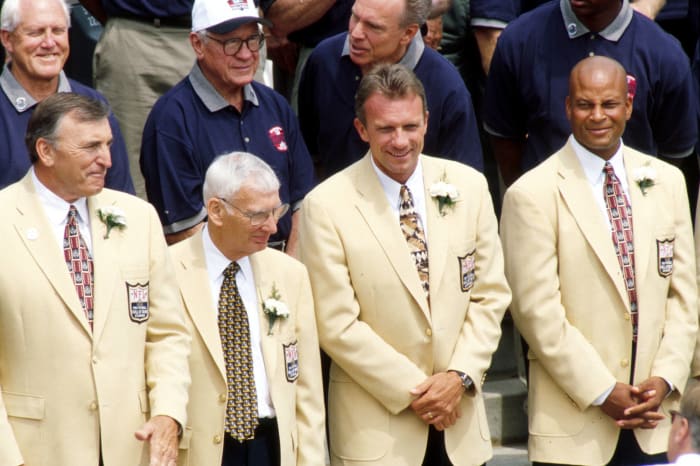
Michael Zagaris/Getty Images
Naturally, the one-time third-round pick was selected for the Pro Football Hall of Fame. Montana was selected to be enshrined for the 2000 class, which was as quickly as “Joe Cool” could be inducted. While he’s not one of the players in both the Pro Football and College Football Hall of Fame, his high school did rename their field “Joe Montana Stadium” in his honor.
19 of 20
An all-time career
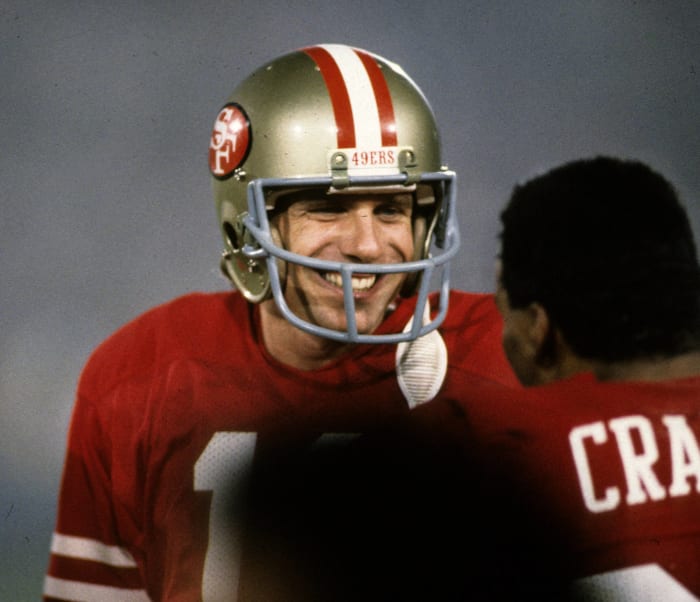
Rob Brown/Getty Images
When the NFL has honored the best of all time, Montana’s name has often come up. He was the quarterback on the NFL’s All-Decade Team for the ‘80s, but he wasn’t just a standout in that decade. Montana was also named to the 75th Anniversary Team, and then the 100th Anniversary Team as well. The 49ers would also retire his number 16 as well.
20 of 20
Calm under pressure, dominant on the field
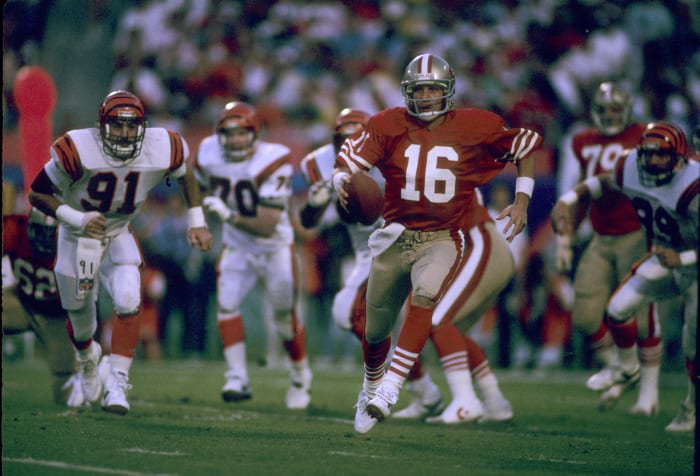
Rob Brown/Getty Images
Montana earned the nickname “Joe Cool” for staying calm when the stakes were high. The story is that before he led the Niners on that winning 92-yard drive against the Bengals in the Super Bowl he pointed out John Candy in the stands to his teammates. He was known for his come-from-behind wins, which helped him to two MVPs and three Super Bowl MVPs. Montana made an All-Pro team six times, and he was efficient for his era. Montana led the league in completion percentage five times. Efficiency matched with calm. That’s how you become a legend.
[ad_2]
Source link




